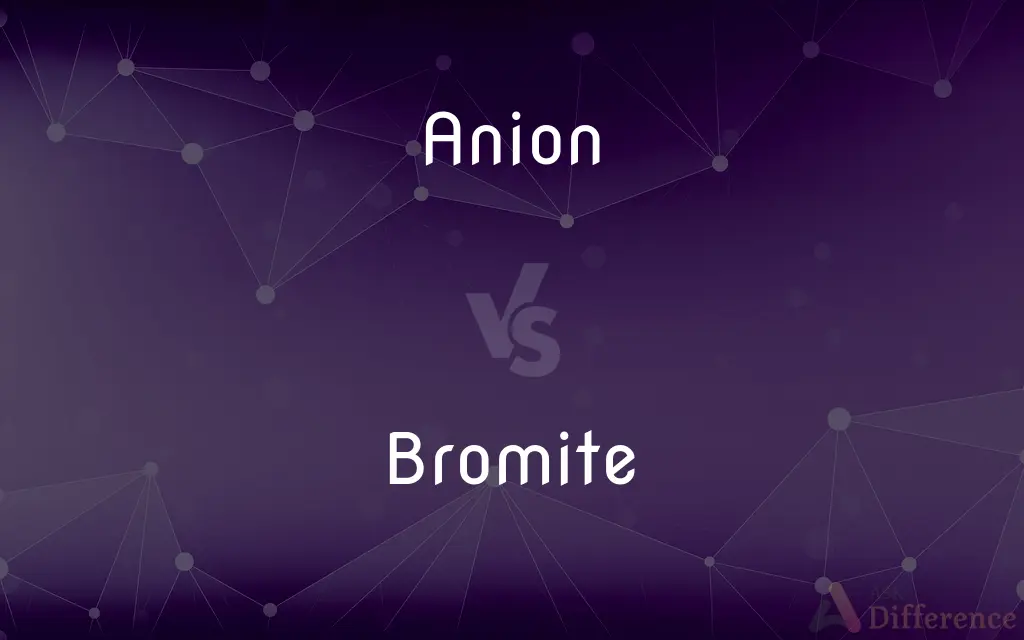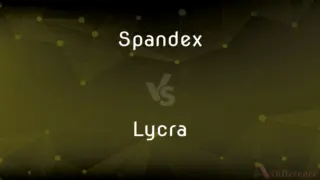Anion vs. Bromite — What's the Difference?
By Tayyaba Rehman — Updated on October 4, 2023
An Anion is a negatively charged ion, while Bromite is a specific anion with the formula BrO₂⁻.

Difference Between Anion and Bromite
Table of Contents
ADVERTISEMENT
Key Differences
Anion and Bromite are terms from the realm of chemistry, but they describe different concepts. An Anion is a general term referring to any ion that has gained electrons, resulting in a negative charge. On the other hand, Bromite represents a specific type of anion, characterized by its chemical composition and distinct properties.
Ions, including Anions, form when atoms gain or lose electrons. The process involves changes in charge, which is fundamental to countless chemical reactions. Bromite, as an example of an anion, signifies a particular chemical compound that contains bromine and oxygen and has a specific negative charge.
The term Anion is broad and encompasses a myriad of ions across the periodic table. Whenever an atom gains electrons, it becomes an anion. Bromite is just one member of this vast category, highlighting the vast diversity of anions that can form in chemical reactions.
While Anions play a role in a wide range of chemical processes and can be formed from nearly any element, Bromite has a more specialized role. This particular anion is commonly encountered in inorganic chemistry and is associated with specific reactions and compounds.
To sum up, while both Anion and Bromite deal with negatively charged ions, Anion is a blanket term encompassing all such ions, and Bromite is a specific instance within that category.
ADVERTISEMENT
Comparison Chart
Definition
A negatively charged ion
Anion with the formula BrO₂⁻
Origin
From gaining electrons
Combination of bromine and oxygen
Specificity
General term for negative ions
Specific type of anion
Range of Occurrence
Found across periodic table
Associated with inorganic chemistry
Chemical Composition
Varies
Contains bromine and oxygen
Compare with Definitions
Anion
A charged atom or molecule with more electrons than protons.
Chloride is an anion commonly found in table salt.
Bromite
An oxyanion of bromine.
Bromite solutions can be used in some chemical tests.
Anion
Atom or molecule derived from loss of hydrogen ions.
In a water solution, hydroxide is a common anion.
Bromite
The anion with the chemical formula BrO₂⁻.
Bromite salts can be prepared by reacting bromine dioxide with bases.
Anion
A result of electron gain by an atom or molecule.
Fluoride, which is an anion, is often added to toothpaste.
Bromite
A negatively charged ion containing bromine and oxygen.
Bromite is less stable than its analog, chlorite.
Anion
The counterpart to a cation in ionic compounds.
In the compound NaCl, Cl⁻ is the anion.
Bromite
A specific instance of an anion with bromine in its reduced form.
Bromite is a part of the family of oxyanions of bromine.
Anion
An ion with a negative charge.
When sodium loses an electron, it becomes positive, while the gained electron makes chlorine an anion.
Bromite
A compound related to hypobromous acid.
The difference between bromate and bromite lies in their oxygen content.
Anion
A negatively charged ion, especially the ion that migrates to an anode in electrolysis.
Bromite
(inorganic chemistry) The univalent anion BrO2−
Anion
A negatively charged ion.
Bromite
(inorganic chemistry) Any salt of bromous acid
Anion
An electro-negative atom or group of atoms, or the element which, in electro-chemical decompositions, is evolved at the anode; - opposed to cation.
Anion
A negatively charged ion
Common Curiosities
What determines if something is an Anion?
An atom or molecule becomes an Anion when it gains electrons.
What is an Anion in simple terms?
An Anion is an atom or molecule with a negative charge due to extra electrons.
Can Bromite be considered an Anion?
Yes, Bromite is a specific type of anion with a negative charge.
What are some uses of Bromite?
Bromite compounds can be used in some chemical reactions and tests.
How does an Anion differ from a Cation?
While an Anion has a negative charge from extra electrons, a Cation has a positive charge from lost electrons.
How many oxygen atoms are in Bromite?
Bromite contains two oxygen atoms.
How is Bromite related to bromine?
Bromite contains bromine combined with oxygen in a specific ratio.
Is Bromite found naturally?
Bromite is not commonly found in nature and is usually synthesized in the lab.
Why are Anions important in chemistry?
Anions play a key role in forming ionic compounds and participating in various chemical reactions.
Share Your Discovery

Previous Comparison
Spandex vs. Lycra
Next Comparison
Drawling vs. DrawingAuthor Spotlight
Written by
Tayyaba RehmanTayyaba Rehman is a distinguished writer, currently serving as a primary contributor to askdifference.com. As a researcher in semantics and etymology, Tayyaba's passion for the complexity of languages and their distinctions has found a perfect home on the platform. Tayyaba delves into the intricacies of language, distinguishing between commonly confused words and phrases, thereby providing clarity for readers worldwide.
















































